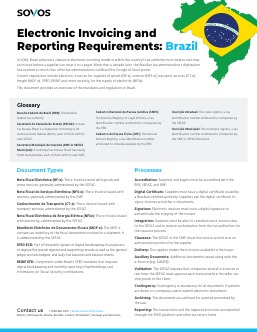Electronic Invoicing and Reporting Requirements: Brazil Glossary Receita Federal do Brasil (RFB): The Brazilian federal tax authority. Secretaria de Fazenda do Estado (SEFAZ): A state tax bureau. Brazil is a federation consisting of 26 states and one federal district, each of them with its own SEFAZ. Secretaria Municipal de Fazenda (SMF or SEFAZ Municipal): A municipal tax bureau. Brazil has nearly 5.500 municipalities, each of them with its own SMF. Document Types Nota Fiscal Eletrônica (NF-e): The e-invoice issued with goods and some services, generally administered by the SEFAZ. Nota Fiscal de Serviços Eletrônica (NFS-e): The e-invoice issued with services, generally administered by the SMF. Conhecimento de Transporte (CT-e): The e-invoice issued with transport services, administered by the SEFAZ. Nota Fiscal Eletrônica de Energia Elétrica (NF3e): The e-invoice issued with electricity, administered by the SEFAZ. Manifesto Eletrônico de Documentos Fiscais (MDF-e): The MDF-e contains an inventory of the fiscal documents involved in a shipment. It is administered by the SEFAZ. SPED ECD: Part of the public system of digital bookkeeping. Its purpose is to digitize the journal register and supporting records as well as the general ledger and sub-ledgers, and daily trial balances and balance sheets. REINF EFD: Component under Brazil’s SPED mandate that requires digital bookkeeping and monthly reporting of withholdings and information on Social Security contributions. In 2008, Brazil adopted a clearance electronic invoicing model in which the country’s tax authority must receive and clear an invoice before a supplier can issue it to a payer. More than a decade later, the Brazilian tax administration’s digitization has evolved so much that other tax administrations call Brazil the Google of fiscal goods. Current regulations include electronic invoices for: supplies of goods (NF-e), services (NFS-e), transport services (CT-e), freight (MDF-e), SPED, REINF and, more recently, for the supply of electricity (NF3e). This document provides an overview of the mandates and regulations in Brazil. Cadastro Nacional da Pessoa Jurídica (CNPJ): The National Registry of Legal Entities, a tax identification number attributed to companies by the RFB. Cadastro de Pessoa Física (CPF): The Natural Persons Registry, a tax identification number attributed to individual people by the RFB. Inscrição Estadual: The state register, a tax identification number attributed to companies by the SEFAZ. Inscrição Municipal: The municipal register, a tax identification number attributed to companies by the SMF or SEFAZ Municipal. Processes Accreditation: Suppliers and buyers must be accredited with the RFB, SEFAZ, and SMF. Digital Certificate: Suppliers must have a digital certificate issued by a Brazilian certified authority. Suppliers use the digital certificate to sign e-invoices and other e-documents. Signature: Electronic invoices must have a digital signature to authenticate the integrity of the invoice. Integration: Suppliers must be able to communicate e-invoice data to the SEFAZ and to receive authorization from the tax authorities for the issuance process. Clearance: The SEFAZ or the SMF clears the invoice and returns an authorization protocol to the supplier. Delivery: The supplier makes the e-invoice available to the buyer. Auxiliary Documents: Additional documents issued along with the e-invoice (e.g.: DANFE). Validation: The SEFAZ requires that companies send all e-invoices in real time; the SEFAZ must approve each invoice before the seller can ship goods to the client. Contingency: Contingency is mandatory for all documents if systems are down or a company cannot submit electronic documents. Archiving: The documents are archived for a period prescribed by the law. Reporting: The transactions and the respective invoices are reported through the SPED platform and other tax return forms. Contact us +1 866 890 3970 | www.sovos.com/contact Boston, Minneapolis, Atlanta, Boulder, London, Amsterdam, Santiago and São PauloNext >
NOTE: This publication is pending deletion . The account which was used to upload this publication needs to be renewed in order for this publication to stay online.

